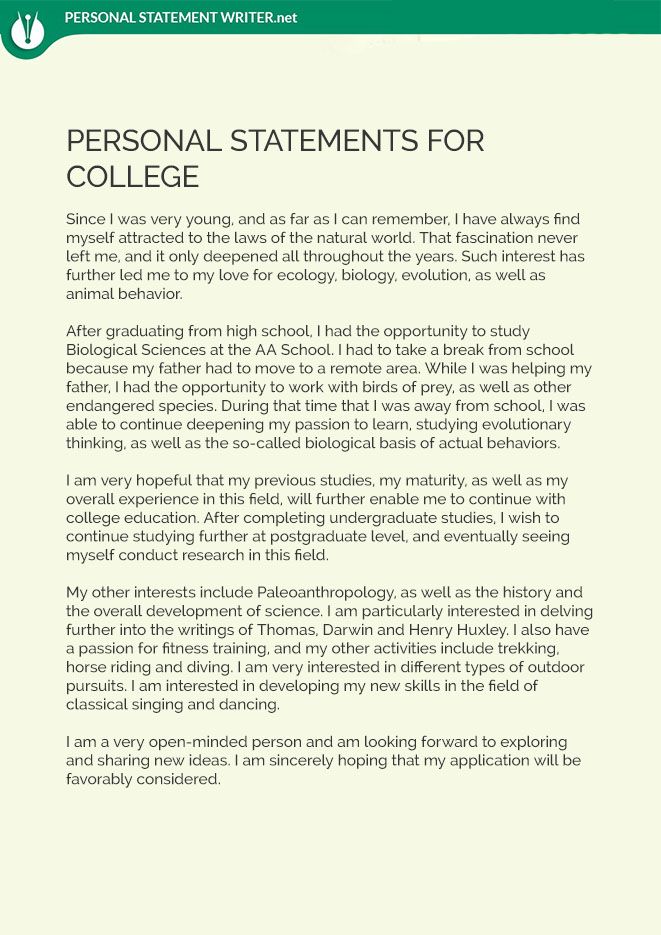How to Write a Personal Statement About Yourself for School Applications

Whether it’s a college application or a job application, your personal statement gives you an opportunity to distinguish yourself. But the key is to know who you are writing for, because that will determine what you choose to talk about and how you present it.
Your personal statement lets you break away from the data on your application, and show who you are beyond your GPA and SAT score. Here are some tips to help you make the most of it:
Be Specific
If your statement isn’t specific enough, it won’t be memorable. The personal statement is your chance to provide more detail about yourself beyond what is already presented on the application form – for example, you might talk about your background and identity, a pivotal moment in your studies or why you chose the programme you’re applying to.
Your personal statement should also give committee members a sense of who you are as a person. This could include the things that inspire you – books, blogs or speakers, inspiring lectures or videos, academic journals and even your favourite holiday destination – and how they’ve shaped your perspectives and ambitions. If you’re able to, highlight any gaps or discrepancies in your educational record that you want to address.
Admissions officers will be assessing both the content of your statement and your writing skills, so don’t go overboard with details or write about too many experiences. This will make your essay look sloppy and unfocused.
A good personal statement will have an ‘aha’ moment that demonstrates your growth as a person. This is particularly effective for students who have been through hardship or adversity and have been able to overcome it. In this case, a great personal statement will convey how the experience has enabled you to see value in your own unique skills and abilities and how these can benefit people around you.
Be Creative
The personal statement is a chance to share an experience or realization that changed your perspective on the world. Often, these experiences are not covered in the Activities section of your application or resume and may only fit in this essay. However, you should be cautious of making your personal statement sound like a play-by-play of your life events. Only include details that enrich your narrative. It is also important to write clearly and get feedback from others on grammar and spelling. You should expect to go through multiple drafts of your essay.
A good way to be creative in your personal statement is to create context and a climax in your story. For example, in this Common App essay, the writer discusses the intersection of their Hispanic heritage and passion for theatre by showing how they struggled to put those two parts of themselves together. This creates a conflict in the story and shows the author’s growth.
Similarly, this Common App essay makes an impact by using descriptive language to bring their interest in Rubik’s cubes to life. Instead of simply saying they were obsessive about the puzzle, the author describes how they “rotated rows aimlessly,” “solved cube after cube” and “constantly pushed the boundaries of speed-solving.” By doing this, the author brings their story to life and captivates the reader’s attention.
Be Concise
Your personal statement shouldn’t be a memoir or a summary of your entire life. Instead, it should be a necessary ingredient in your application package. It can help you address a topic that wouldn’t fit in your resume due to limited space; tell a story you couldn’t include in an essay or letter of recommendation, such as an overcoming obstacle; or simply add some depth to a part of your application that needs extra attention.
While it is tempting to include as much information as possible in a personal statement, the purpose of your statement is to provide admissions committee members with a clear idea of who you are and why you will be an excellent student at their programme. It is easy to bore them with details that are not relevant to your programme and can make you seem unreliable or a bad fit for their school.
It is also important to avoid sharing anything too private. You should not discuss relationships or bodily functions in your personal statement, and you should not write about illegal activities, as this could send a negative message about your character. If you are unsure whether something should be included in your personal statement, ask someone else to read it and offer feedback. They can help you identify any inappropriate elements and ensure your statement is coherent, clear and well-written.
Be Original
If you choose to write a personal statement for your school applications, it should tell an original story about your experiences. It is important to keep in mind that your personal statement will be read by admissions committee members who are trying to decide whether or not you are a good fit for their programme and their institution. Writing a generic, boring and retold personal statement is one of the worst things that you can do. An admissions committee member reading such a statement will think that you are either filling up space or just trying to show off about your background and achievements.
If the application allows for it, you should also try to connect your personal statement to your chosen degree programme. For example, if you are applying to a PhD programme in psychology, it would be appropriate to write about how your life experiences and challenges have made you want to study this field. However, you should not discuss your personal struggles and problems in a way that suggests that you are unable to deal with or overcome them.
After you have written a first draft of your personal statement, take a step back for a few hours or even a day and then look at it with fresh eyes. It is also helpful to get feedback from outside sources, such as friends, family and academic advisors.





